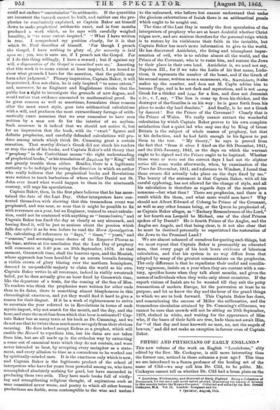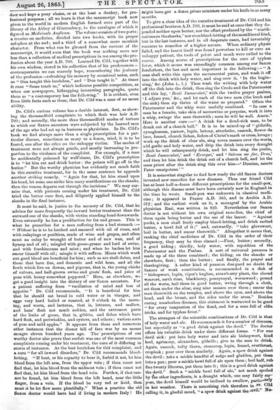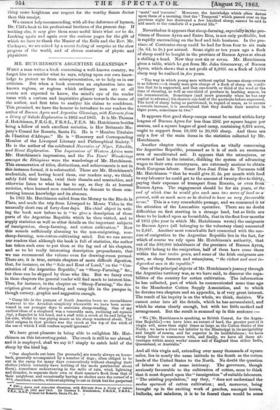PHYSIC AND PHYSICLLNS OF EARLY ENGLAND.* Ills new volume of
the work on English " Leechdoms," ably edited by the Rev. Mr. Cockayne, is still more interesting than the former one, noticed in these columns a year ago.t This time we are introduced to a Saxon professor of the healing art of the name of Cild—we may call him Dr. Cild, to be polite. Mr. Cockayne cannot tell us whether Dr. Cild had a brass plate on the • Leeclaornr, Worteanning, and Stareraft of Early England. Being a Collection of Documents, fur the mo.t part never before printed, illustrating the history of Science in this country before the Boman Conquest. Collected and editel toy the Be,. Oswald Cocikeyne, M.A. Vol. IL London: Longman and Co.
+ Fpeaceor, Angus; 1804.
door and kept a pony chaise, or at the least a donkey, for pro- fessional purposes ; all we learn is that the manuscript book now given to the world in modern English formed once part of the library of the Abbey of Glastonbury, in the catalogue of which it figured as Medicinale Anglicum. The volume consists of two parts; a treatise on medicine, divided into two books, with its proper colophon at the end ; and a third of a somewhat more monkish character. From what can be gleaned from the context of the manuscript, it would seem that the book was nothing more nor less than a collection of medical prescriptions in use among the pro- fession about the year A.D. 700. Learned Dr. Cild, together with his own wisdom, stored in his collection that of his predecessors contemporaries we can scarcely hope, remembering the jealousy of the profession—refreshing his memory by occasional notes, such as " Oxa taught this leechdom," and "Dun taught it." At times it runs " Some teach us," which indicates possible competition, as when our newspapers, kidnapping interesting paragraphs, quote them as "a contemporary has the following." It is evident, even from little facts such as these, that Dr. Cild was a man of no mean ability.
Dr. Cild's curious volume has a double interest, first, as show- ing the thousandfold complaints to which flesh was heir A.D. 700; and secondly, the more than thousandfold modes of torture to which our Saxon ancestors were subjected by the learned men of the age who had set up in business as physicians. In Dr. Cild's book we find always more than a single prescription for a par- ticular disease, sometimes as many as a dozen, tried, it is to be feared, one after the other on the unhappy victim. The modes of treatment were not always gentle, and mostly increasing in pro- portion to the virulence of the complaint. For example, if a man be accidentally poisoned by wolf'sbane, Dr. Cild's prescription is to " let him eat and drink butter : the poison will go off in the butter." But the worthy physician has evidently not much faith in this curative treatment, for in the same sentence he appends another striking remedy. " Again for that, let him stand upon his head, let some one strike him many scarification on the shanks, then the venom departs out through the incisions." We may sur- mise that, with patients coining under his treatment, Dr. Cild tried the butter cure first, and diligently applied himself to the shanks in the final instance.
It must be said, in justice to the memory of Dr. Cild, that he advises far more frequently the inward butter treatment than the outward one of the shanks, with victim standing head downwards. Even outwardly he has a predilection for fat and grease. This is- what he prescribes for a man suffering from a bad stomach :— 4' Without he is to be leeched and smeared with oil of roses, and with onlayings or poultices, made of wine and grapes, and often must an onlay be wrought of butter and of new wax, and of hyssop and of oil ; mingled with goose-grease and lard of swine, and with frankincense and mint ; and when he bathes let him smear himself with oil ; mingle it with saffron. Meats which work out good blood are beneficial for him; such as are shell-fishes, and those that have fins, and domestic and wild hens, and all the fowls which live on downs, and pigeons, that is, the young chicks of culvers, and half-grown swine and goats' flesh, and juice of peas with honey somewhat peppered." Here, as elsewhere, we get a good insight into the dietary of our Saxon ancestors. For a patient suffering from "vacillation of mind and loss of appetite " Dr. Cild recommends, " It is beneficial for him that he should eat bread in cold water or in vinegar, and eggs very hard boiled or roasted, at 9 o'clock in the morn- ing, and worts, and laetutas, that is, lettuces, and mallow, and hens' flesh not much sodden, and the extremest parts of the limbs of goose, that is, giblets, and fishes which have hard flesh, and periwinkles, and oysters, and others ; various sorts of peas and mild apples." It appears from these and numerous other instances that the dinner bill of fare was by no means meagre eleven hundred years ago. The -prescriptions of our worthy doctor also prove that surfeit was one of the most common complaints coming under his treatment, the cure of it differing in scores of instances. As the best leechdom for this complaint, and a cure "for all inward disorders," Dr. Cild recommends blood- letting. "If heat, or his capacity to bear it, forbid it not, let him blood from the left arm, from the upper vein ; if then eanst not find that, let him blood from the midmost vein ; if thou cant not find that, let him blood from the head vein. Further, if that can- not be found, let him blood from the left hand, near the little finger, from a vein. If the blood be very red or livid, then must it be let flow more plentifully." What a practice the old Saxon doctor would have had if living in modern Italy ! He
might have got a dozen prime ministers under his knife in as many months.
To give a clear idea of the curative treatment of Dr. Cild and his professional brethren A.D. 700, it must be said at once that they de- pended neither upon butter, nor the effect produced by the " scarifi- cationson theshanks," nor evenblood-letting of the mostliberal kind, but in the last instance, and in all desperate cases, had invariably recourse to remedies of a higher nature. When ordinary physic failed, and the lancet itself was found powerless to kill or cure an unhappy patient, the tools of priest and monk were called to the rescue. Among scores of prescriptions for the cure of typhus fever, which it seems was exceedingly common among our Saxon forefathers, the last and most important is the following :—" A man shall write this upon the sacramental paten, and wash it off into the drink with holy water, and sing over it, In the begin- ning,' &c. (John i., 1.) Then wash the writing with holy water off the dish into the drink, then sing the Credo and the Paternoster and this lay, Beati Immaculati,' with the twelve prayer psalms, ' I adjure you,' &c., and let each of the two men (the leech and the sick) then sip thrice of the water so prepared." Often the Paternoster and the whip were usefully combined. " In case a man be a lunatic, take skin of inereswine or porpoise, work it into a whip, swinge the man therewith ; soon he will be well. Amen." Here is another cure :—" A drink for a fiend-sick man, to be drunk out of a church bell." It is to be mixed-up of " githrife, cynoglossum, yarrow, lupin, betony, attorlothe, cassock, flower de lute, fennel, church lichen, lichen of Christ's mark or cross, lovage ; work up the drink of clear ale, sing seven masses over the worts, add garlic and holy water, and drip the drink into every draught which he will subsequently drink, and let him sing the psalm, ' Beati Immaculati,' and 'Exurgat,' and Salem me fac, Deus,' and then let him drink the drink out of a church bell, and let the mass priest after the drink sing this over him—' Domine, sancta Pater omnipotens.' " It is somewhat singular to find how ready the old Saxon doctors invented new remedies for new diseases. Thus our friend Cild has at least half-a-dozen different prescriptions for the small-pox, although this disease must have been certainly new in England in the time he wrote. Small-pox was unknown in classical medi- cine ; it appeared in France A.D. 565, and in Arabia A.D. 572: and the earliest work on it, a monograf by the Arabia physician Razi, was written in 923. Nevertheless our Saxon doctor is not without his own original remedies, the chief of them again being butter and the use of the lancet. " Against pocks, a man shall freely employ blood-letting, and drink melted butter, a bowl full of it ;" and, outwardly, "take glovewort, boil in butter, and smear therewith." Altogether it seems that, ranking the chief medicines of Dr. Cild in the order of their frequency, they may be thus classed :—First, butter ; secondly, a good hiding ; thirdly, holy water, with repetition of the Paternoster and the Psalms. A sort of universal panacea is made up of the three combined ; the hiding, on the shanks or elsewhere, first ; then the butter; and finally, the prayei and thanksgiving. A softer kind of panacea designed no doubt for Saxons of weak constitution, is recommended in a dish of " bishopwort, lupin, viper's bugloss, strawberry plant, the cloyed wenvort, earth rime, blackberry, pennyroyal, wormwood ; pound all the worts, boil them in good butter, wring through a cloth, set them under the altar, sing nine masses over them ; smear the man therewith on the temples, and above the eyes, and above the head, and the breast, and the sides under the arms." Besides
curing numberless diseases, this ointment is warranted to be good " for every temptation of the fiend, and for a man full of elfin tricks, and for typhus fever."
The strangest of the scientific combinations of Dr. Cild is that of holy water and ale. He recommends it for a number of diseases, but especially as "a good drink against the devil." The doctor
offers his valuable drink under three different forms. " For one devil sick: put into holy water and into ale bishopwort, hind
heel, agrimony, alexanders, githrife ; give to the man to drink.
Again, cassock, tufty thorn, stonecrop, lupin, fennel, everthroat, cropleek ; pour over them similarly. Again, a spew drink against the devil : take a mickle handful of sedge and gladden, put them into a pan ; pour a mickle bowl frill of ale upon them ; boil half, rub fine twenty libcorns, put them into it ; this is a good drink against
the devil." Such a "mickle bowl hill of ale," not much spoiled
by Are other ingredients, is a draught which, one may fairly sin" pose, the devil himself would be inclined to swallow, particwsrlY
in hot weather. There is something rich therefore in -7r. Cild calling it, in gleeful mood, "a spew drink against the levil." No-
thing more heightens our respect for the worthy Saxon doctor than this receipt.
We cannot help recommending, with all due deference of laymen, Dr. Cild's book to his professional brethren of the present day. If nothing else, it may give them some useful hints what not to do. Looking again and again over the curious pages for the gift of which we have to thank the Master of the Rolls and the Rev. Mr. Cockayne, we are seized by a secret feeling of surprise at the slow progress of the world, and of eleven centuries of physic and physicians.
































 Previous page
Previous page